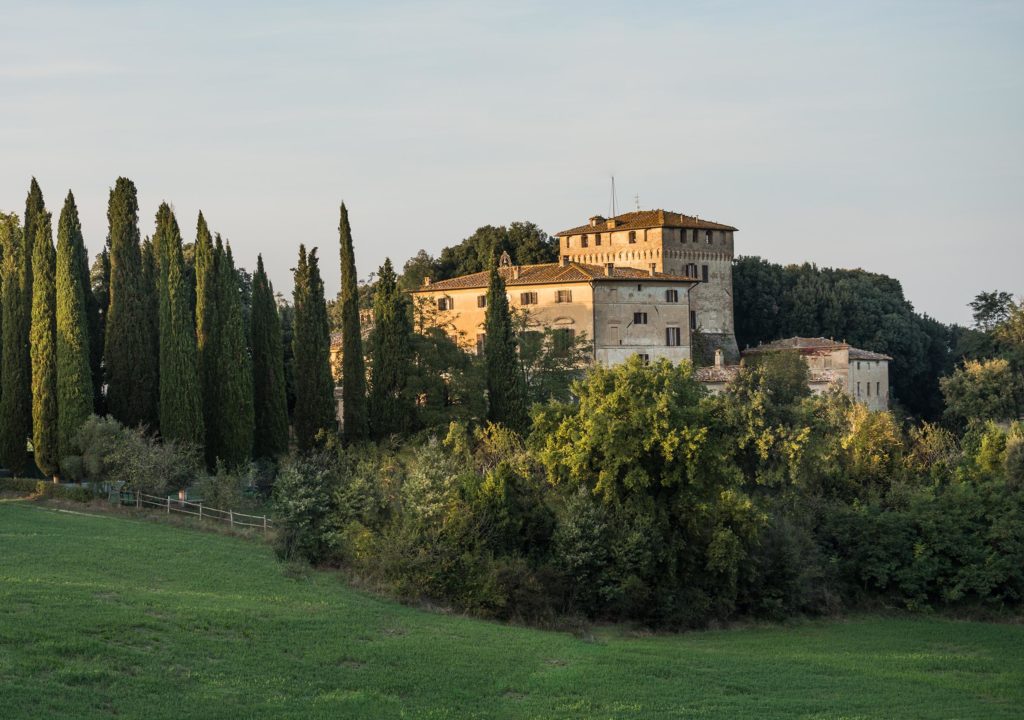
Although there is no shortage of public gardens under the Tuscan sun, Sunday, May 27 brings the exclusive opportunity to discover the hidden beauty of the gardens and courtyards of the region’s finest residences. Close to 100 privately-owned historic villas, castles, and palaces will welcome Italian and foreign visitors alike to experience the magic and romance of the Tuscan landscape, free of charge. The openings are part of the A.D.S.I Giardini e Cortili Aperti, an initiative by the Association of Historic Italian Dwellings (A.D.S.I).
Aside from the chance to tour little-known labyrinth gardens containing antique sculptures, visitors are invited to events that speak of the historic, artistic, and architectural significance of the estates. While admission to the estates is free, there are itineraries, concerts, and wine tastings during the day available for a small fee. The A.D.S.I Giardini e Cortili Aperti will take place all over Tuscany, including in Siena, Lucca, and Pisa and in quieter areas, such as the Mugello and Val di Sieve countryside. Between the golden wheat of Crete Senesi and the rolling hills of the Val d’Orcia, several of the 12 venues in the Siena program will offer castle tours.
In the historical center of Lucca, besides strolling through the greenery of the city’s seven open palatial gardens, guests will have the culturally-enriching opportunity to visit “The Nose and History” at the Palazzo Ducale. This unique sensory exhibition features the perfumes of the daughter of King Charles IV, Duchess Maria Luisa, and Elisa Bonaparte Baciocchi, the sister of Napoleon Bonaparte, both rulers of the Lucca.
As part of the “Ruschi Palace and Gardens of Pisa” guided visit by City Grand Tour, Pisa’s 18th century Palazzo Ruschi will also be unveiling its frescoes for the occasion. People can explore the ornate ballroom decorated with mythological scenes, climb the magnificent staircase, view the gallery, and venture through the secret gardens of Pisa (€10).
Ten more places than last year will be accessible to the general public in the 2018 edition of “Giardini e Cortili Aperti.” The itinerary will be particularly enhanced by the opening of four mansions in Valdinievole. Of the four residences, the Villa del Castellaccio in Uzzano is home to the piano on which the famous Italian opera composer Giacomo Puccini wrote the 2nd and 3rd acts of La Bohème. Visitors will have access to the main rooms, gardens, and chapels of the home.
Below is a sampling of other sights worth visiting.
Wine
Trebbio Castle, via Santa Brigida 9, Santa Brigida: This beautiful castle in the Chianti Rufina area is home to a vibrant farm, a vineyard, and olive groves. The Trebbio Castle was constructed by the infamous Pazzi family in the 12th century, rivals of the Medici family who sought to assassinate Lorenzo the Magnificent. Guided tours of the courtyard and the historic cellars will take place from 10 am to 5 pm. Visitors will have access to a paid tasting opportunity, and can purchase wine, jams, marmalades, and virgin olive oil from the castle.
Villa Bossi Park, via dello Stracchino 32, Pontassieve: An estate whose magnificence is rivaled by few. Spread out around a Renaissance-style garden, the Villa Bossi boasts ancient wine cellars with brick-vaulted ceilings and a 46-room complex. Explore the park. Visit the cellars. Taste the wine. Attend the “Wisteria and the Territory of the Val di Sieve” painting exhibition.
Art & Poetry
The Medici Park of Pratolino, Via Fiorentina 276 Pratolino – Vaglia: The spacious park is perfect for a picnic and can be accessed from 10 am to 8 pm, even by public transportation (bus 25 from San Marco). Venture to the park’s open-air museum from 10 am to 1 pm and from 2 pm to 7 pm to see Cupid’s grotto and the domed chapel built by Buontalenti in 1580 on the estate that was purchased by Francesco I de’ Medici in 1568. Above the grotto resides Colossus of the Apennines, a giant statue carved out of stone and brick by Renaissance artist Giambologna.
Casa Carducci, Via Carducci 1, Castagneto Carducci (Livorno): A vision of tranquility tucked away in the verdant hills of the province of Livorno, Castagneto Carducci is named after Giosuè Carducci. The Italian poet (1835 – 1907) won the Nobel Prize in literature in 1906. Spend the afternoon in the chapel and in the home the poet lived in for some years on Tuscany’s Etruscan Coast.
History
Guidi Castle of Poppi, Castel San Niccolò, Strada in Casentino (Arezzo): From 2 pm to 4 pm, guided group tours each hour will be revealing the frescoed walls painted by Taddeo Gaddi and the archaic stonework of the medieval Poppi Castle. Built roughly around the 12th century, the impressive castle originally served as the residence of the Guidi counts. Legend has it that the castle is haunted by Matelda, the ghost of the beautiful wife of one of the Guidi counts, who locals claim has appeared at the window of the Poppi Castle dressed in white.
Porciano Castle, via Dante Alighieri, Porciano – Pratovecchio, Stia (Arezzo): The castle will be open from 10 am to 1 pm and from 3 pm to 7 pm. Like the castle in Casentino, the fortified residence belonged to the powerful Guidi counts and is dominated by an imposing tower. The fortress affords a clear view of the Poppi castle and of the Casentino Valley. During Dante’s time in exile from Florence, the Divine Comedy author was hosted in Porciano by the counts and wrote three famous letters in the castle.
Music
Villa di Bivigliano, via del Viliani 84, Bivigliano (Vaglia): Open from 10 am to 7 pm with free guided tours in the gardens and a warm welcome inside the villa from the Pozzolino family. At 11:30 am, the music of a live flute and guitar duet performance by Olivia Gigli and Mikhail Pazi will float throughout the estate, which has an aura of refined simplicity. The program includes works by international composers Lanari, Tavolaro, Bartok, and others. From 3 pm to 5pm, the Archaeological Association of Florence will host a nature walk with stories about the plants and wild herbs of the gardens.
Casa dell’Abate Naldi, via Dante Alighieri 24 – San Quirico d’Orcia: The Casa dell’Abate Naldi is especially worth a visit due to its vine-covered stone archways and balcony overlooking the hanging gardens. Admire the view of the village from the rooftop while listening to “Il Vento Incantatore,” a flute and clarinet performance by Claudio Sutrini and Rosa Franciamore inspired by French 20th century music beginning at 6 pm.
For more information on locations and opening hours, visit the official website of the Association of Historic Italian Dwellings: www.adsi.it







